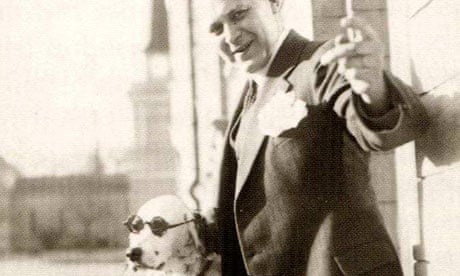Germany's Nazi government was so angry about a dog trained to imitate Hitler that it started an obsessive campaign against its Finnish owner, according to newly discovered documents.
In the middle of the second world war, the foreign office in Berlin commanded its diplomats in Nazi-friendly Finland to gather evidence on the dog, and even came up with plans to destroy the pharmaceutical wholesale company of the dog's owner.
Historians had not been aware of the strange footnote to the Nazi period before some 30 files containing parts of the correspondence and diplomatic cables were recently found by a researcher in the political archives of the German foreign office.
Klaus Hillenbrand, who has written several books on the Nazi period, was contacted by the historian and examined all of the documents for an article to be published tomorrow in the daily newspaper Die Tageszeitung.
Hillenbrand called the episode "completely bizarre". "Just months before the Nazis launched their attack on the Soviet Union, they had nothing better to do than to obsess about this dog," he said.
The dog, Jackie, was owned by Tor Borg, a businessman from Tampere. Borg's wife, Josefine, a German citizen known for her anti-Nazi sentiments, dubbed the dog Hitler because of the strange way it raised its paw high in the air like Germans greeting the Führer with a cry of "Heil Hitler!"
On 29 January 1941, the German vice-consul in Helsinki, Willy Erkelenz, wrote that "a witness, who does not want to be named, said ... he saw and heard how Borg's dog reacted to the command 'Hitler' by raising its paw".
Borg was ordered to the German embassy in Helsinki and questioned about his dog's unusual trick. He denied ever calling the dog by the German dictator's name, but admitted that his wife called the dog Hitler.
He tried to play down the accusations, saying the paw-raising had only happened a few times in 1933 – shortly after Hitler came to power – and assured the Nazi diplomats that he never did anything "that could be seen as an insult against the German Reich".
The zealous diplomats in Helsinki did not believe him and wrote back to Berlin that "Borg, even though he claims otherwise, is not telling the truth".
The different ministries involved in the dog scandal – the foreign office, the economy ministry and even Hitler's chancellory – meticulously reported their findings about the canine.
The economy ministry announced that the German chemical conglomerate IG Farben, which had supplied Borg's wholesale trade with pharmaceuticals, offered to eliminate his company by ending their cooperation with him.
The foreign office looked for ways to bring Borg to trial for insulting Hitler, but none of the potential witnesses were willing to repeat their accusations in front of a judge.
On 21 March 1941, the foreign office asked the chancellory whether to press charges against Borg and five days later the chancellory answered that "considering that the circumstances could not be solved completely, it is not necessary to press charges".
There is no evidence that Hitler was told of the case, Hillenbrand said.
Tor Borg died at 60 in 1959. His company Tampereen Rohdoskauppa Oy eventually became Tamro Group, the leading wholesale company for pharmaceuticals in the Nordic region.
A spokeswoman for Tamro Group, Margit Nieminen, said the company had not been aware of the story of Borg's dog until the recent archive discovery.
